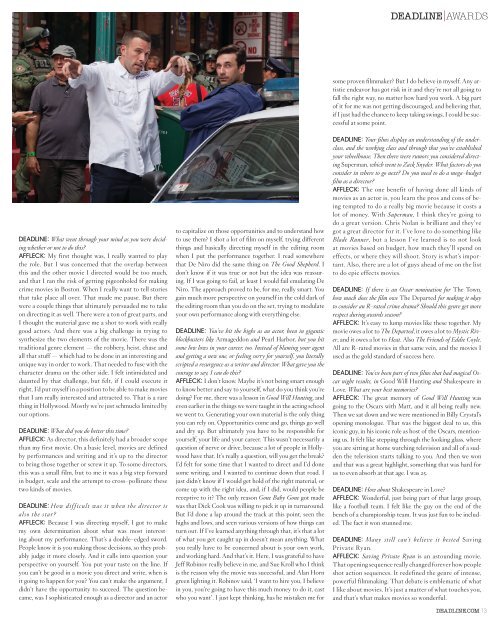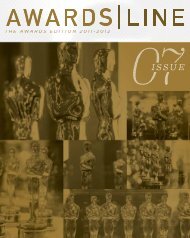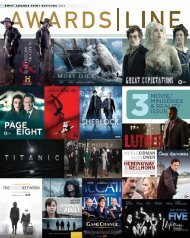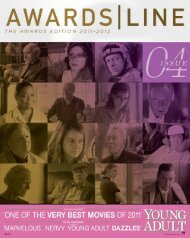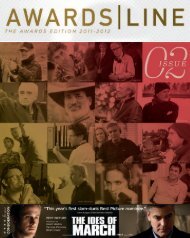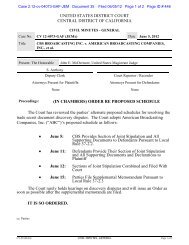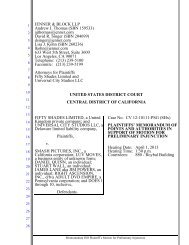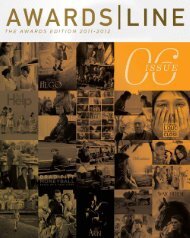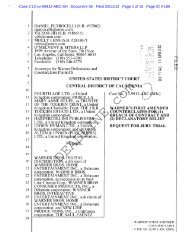the awards editions 2010-2011
the awards editions 2010-2011
the awards editions 2010-2011
You also want an ePaper? Increase the reach of your titles
YUMPU automatically turns print PDFs into web optimized ePapers that Google loves.
DeaDline: What went through your mind as you were deciding<br />
whe<strong>the</strong>r or not to do this?<br />
affleck: My first thought was, I really wanted to play<br />
<strong>the</strong> role. But I was concerned that <strong>the</strong> overlap between<br />
this and <strong>the</strong> o<strong>the</strong>r movie I directed would be too much,<br />
and that I ran <strong>the</strong> risk of getting pigeonholed for making<br />
crime movies in Boston. When I really want to tell stories<br />
that take place all over. That made me pause. But <strong>the</strong>re<br />
were a couple things that ultimately persuaded me to take<br />
on directing it as well. There were a ton of great parts, and<br />
I thought <strong>the</strong> material gave me a shot to work with really<br />
good actors. And <strong>the</strong>re was a big challenge in trying to<br />
syn<strong>the</strong>size <strong>the</strong> two elements of <strong>the</strong> movie. There was <strong>the</strong><br />
traditional genre element — <strong>the</strong> robbery, heist, chase and<br />
all that stuff — which had to be done in an interesting and<br />
unique way in order to work. That needed to fuse with <strong>the</strong><br />
character drama on <strong>the</strong> o<strong>the</strong>r side. I felt intimidated and<br />
daunted by that challenge, but felt, if I could execute it<br />
right, I’d put myself in a position to be able to make movies<br />
that I am really interested and attracted to. That is a rare<br />
thing in Hollywood. Mostly we’re just schmucks limited by<br />
our options.<br />
DeaDline: What did you do better this time?<br />
affleck: As director, this definitely had a broader scope<br />
than my first movie. On a basic level, movies are defined<br />
by performances and writing and it’s up to <strong>the</strong> director<br />
to bring those toge<strong>the</strong>r or screw it up. To some directors,<br />
this was a small film, but to me it was a big step forward<br />
in budget, scale and <strong>the</strong> attempt to cross–pollinate <strong>the</strong>se<br />
two kinds of movies.<br />
DeaDline: Ho w d i f f i c u l t wa s i t w h e n t h e d i re c t o r i s<br />
also <strong>the</strong> star?<br />
affleck: Because I was directing myself, I got to make<br />
my own determination about what was most interesting<br />
about my performance. That’s a double–edged sword.<br />
People know it is you making those decisions, so <strong>the</strong>y probably<br />
judge it more closely. And it calls into question your<br />
perspective on yourself. You put your taste on <strong>the</strong> line. If<br />
you can’t be good in a movie you direct and write, when is<br />
it going to happen for you? You can’t make <strong>the</strong> argument, I<br />
didn’t have <strong>the</strong> opportunity to succeed. The question became,<br />
was I sophisticated enough as a director and an actor<br />
to capitalize on those opportunities and to understand how<br />
to use <strong>the</strong>m? I shot a lot of film on myself, trying different<br />
things and basically directing myself in <strong>the</strong> editing room<br />
when I put <strong>the</strong> performance toge<strong>the</strong>r. I read somewhere<br />
that De Niro did <strong>the</strong> same thing on The Good Shepherd. I<br />
don’t know if it was true or not but <strong>the</strong> idea was reassuring.<br />
If I was going to fail, at least I would fail emulating De<br />
Niro. The approach proved to be, for me, really smart. You<br />
gain much more perspective on yourself in <strong>the</strong> cold dark of<br />
<strong>the</strong> editing room than you do on <strong>the</strong> set, trying to modulate<br />
your own performance along with everything else.<br />
DeaDline: You’ve hit <strong>the</strong> highs as an actor, been in gigantic<br />
blockbusters like Armageddon and Pearl Harbor, but you hit<br />
some low lows in your career, too. Instead of blaming your agent<br />
and getting a new one, or feeling sorry for yourself, you literally<br />
scripted a resurgence as a writer and director. What gave you <strong>the</strong><br />
courage to say, I can do this?<br />
affleck: I don’t know. Maybe it’s not being smart enough<br />
to know better and say to yourself, what do you think you’re<br />
doing? For me, <strong>the</strong>re was a lesson in Good Will Hunting, and<br />
even earlier in <strong>the</strong> things we were taught in <strong>the</strong> acting school<br />
we went to. Generating your own material is <strong>the</strong> only thing<br />
you can rely on. Opportunities come and go, things go well<br />
and dry up. But ultimately you have to be responsible for<br />
yourself, your life and your career. This wasn’t necessarily a<br />
question of nerve or drive, because a lot of people in Hollywood<br />
have that. It’s really a question, will you get <strong>the</strong> break?<br />
I’d felt for some time that I wanted to direct and I’d done<br />
some writing, and I wanted to continue down that road. I<br />
just didn’t know if I would get hold of <strong>the</strong> right material, or<br />
come up with <strong>the</strong> right idea, and, if I did, would people be<br />
receptive to it? The only reason Gone Baby Gone got made<br />
was that Dick Cook was willing to pick it up in turnaround.<br />
But I’d done a lap around <strong>the</strong> track at this point, seen <strong>the</strong><br />
highs and lows, and seen various versions of how things can<br />
turn out. If I’ve learned anything through that, it’s that a lot<br />
of what you get caught up in doesn’t mean anything. What<br />
you really have to be concerned about is your own work,<br />
and working hard. And that’s it. Here, I was grateful to have<br />
Jeff Robinov really believe in me, and Sue Kroll who I think<br />
is <strong>the</strong> reason why <strong>the</strong> movie was successful, and Alan Horn<br />
green lighting it. Robinov said, ‘I want to hire you, I believe<br />
in you, you’re going to have this much money to do it, cast<br />
who you want’. I just kept thinking, has he mistaken me for<br />
some proven filmmaker? But I do believe in myself. Any artistic<br />
endeavor has got risk in it and <strong>the</strong>y’re not all going to<br />
fall <strong>the</strong> right way, no matter how hard you work. A big part<br />
of it for me was not getting discouraged, and believing that,<br />
if I just had <strong>the</strong> chance to keep taking swings, I could be successful<br />
at some point.<br />
DeaDline: Your films display an understanding of <strong>the</strong> underclass,<br />
and <strong>the</strong> working class and through that you’ve established<br />
your wheelhouse. Then <strong>the</strong>re were rumors you considered directing<br />
Superman, which went to Zack Snyder. What factors do you<br />
consider in where to go next? Do you need to do a mega–budget<br />
film as a director?<br />
affleck: The one benefit of having done all kinds of<br />
movies as an actor is, you learn <strong>the</strong> pros and cons of being<br />
tempted to do a really big movie because it costs a<br />
lot of money. With Superman, I think <strong>the</strong>y’re going to<br />
do a great version. Chris Nolan is brilliant and <strong>the</strong>y’ve<br />
got a great director for it. I’ve love to do something like<br />
Blade Runner, but a lesson I’ve learned is to not look<br />
at movies based on budget, how much <strong>the</strong>y’ll spend on<br />
effects, or where <strong>the</strong>y will shoot. Story is what’s important.<br />
Also, <strong>the</strong>re are a lot of guys ahead of me on <strong>the</strong> list<br />
to do epic effects movies.<br />
DeaDline: If <strong>the</strong>re is an Oscar nomination for The Town,<br />
how much does <strong>the</strong> film owe The Departed for making it okay<br />
to consider an R–rated crime drama? Should this genre get more<br />
respect during <strong>awards</strong> season?<br />
affleck: It’s easy to lump movies like <strong>the</strong>se toge<strong>the</strong>r. My<br />
movie owes a lot to The Departed, it owes a lot to Mystic River,<br />
and it owes a lot to Heat. Also The Friends of Eddie Coyle.<br />
All are R–rated movies in that same vein, and <strong>the</strong> movies I<br />
used as <strong>the</strong> gold standard of success here.<br />
DeaDline: You’ve been part of two films that had magical Oscar<br />
night results, in Good Will Hunting and Shakespeare in<br />
Love. What are your best memories?<br />
affleck: The great memory of Good Will Hunting was<br />
going to <strong>the</strong> Oscars with Matt, and it all being really new.<br />
Then we sat down and we were mentioned in Billy Crystal’s<br />
opening monologue. That was <strong>the</strong> biggest deal to us, this<br />
iconic guy, in his iconic role as host of <strong>the</strong> Oscars, mentioning<br />
us. It felt like stepping through <strong>the</strong> looking glass, where<br />
you are sitting at home watching television and all of a sudden<br />
<strong>the</strong> television starts talking to you. And <strong>the</strong>n we won<br />
and that was a great highlight, something that was hard for<br />
us to even absorb at that age. I was 25.<br />
DeaDline: How about Shakespeare in Love?<br />
affleck: Wonderful, just being part of that large group,<br />
like a football team. I felt like <strong>the</strong> guy on <strong>the</strong> end of <strong>the</strong><br />
bench of a championship team. It was just fun to be included.<br />
The fact it won stunned me.<br />
DeaDline: Many still can’t believe it bested Saving<br />
Private Ryan.<br />
affleck: Saving Private Ryan is an astounding movie.<br />
That opening sequence really changed forever how people<br />
shot action sequences. It redefined <strong>the</strong> genre of intense,<br />
powerful filmmaking. That debate is emblematic of what<br />
I like about movies. It’s just a matter of what touches you,<br />
and that’s what makes movies so wonderful.<br />
deadline.com 13


